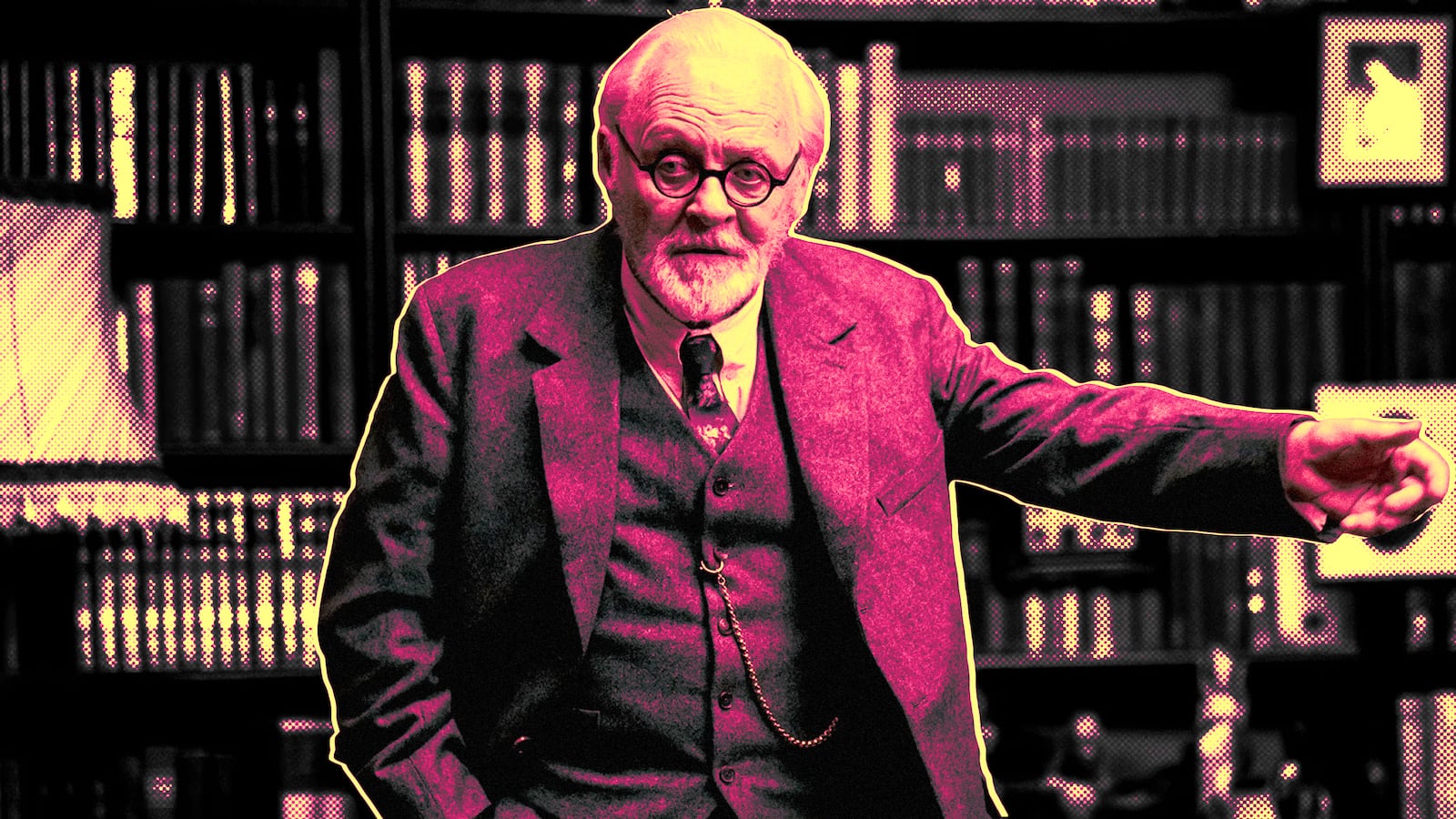There’s no record of Sigmund Freud chatting with C.S. Lewis shortly before his 1939 death, but Freud’s Last Session envisions such a meeting and its lively debate about both the existence of God and the hang-ups that defined them. An adaptation of Mark St. Germain’s play of the same name (which itself was based on Armand Nicholi’s 2002 book The Question of God: C.S. Lewis and Sigmund Freud Debate God, Love, Sex, and the Meaning of Life), director Matt Brown’s film is a stately affair that’s never particularly intellectually incisive or revealing, and its stolid execution fails to transcend the material’s inherent staginess. At least, as the father of psychoanalysis, Anthony Hopkins gets an opportunity to expertly chew scenery, although he’s the sole one who ultimately comes out very nourished.
Co-written by Brown and St. Germain, Freud’s Last Session, in theaters Dec. 22, opens with a quote from John Bunyan: “As I walked through the wilderness of this world, I lighted on a certain place where was a den, and laid me down to sleep, and as I slept, I dreamed a dream.” Both a den and dreams factor into the ensuing dramatic equation, as does Bunyan himself, given that Lewis (Matthew Goode) is known for his 1933 book The Pilgrim’s Regress, a satiric take on Bunyan’s 1678 allegory The Pilgrim’s Progress. Freud dismisses Lewis’ work and much of his worldview, this despite the fact that he’s invited him to his home to talk as radio news reports provide updates on Hitler’s invasion of Poland (and the 20,000 who’ve perished in its first two days), and as Londoners respond to the crisis by shepherding their children off to the countryside for safe keeping.
A footnote indicates that Lewis’ decision to take in orphaned boys and girls during this tumultuous period helped inspire his The Chronicles of Narnia. However, by that late point director Brown has already suggested as much via an early glimpse of Lewis watching parents bid farewell to their kids on a train platform. Lewis’ painful adolescent experience being sent by his Irish widower dad to a British boarding school is also part of his formative stew, and dramatized in some of the film’s frequent flashbacks, most of which do little to deepen that which is already being articulated by its two protagonists. By and large, these glimpses into yesteryear feel like a means of simultaneously padding the runtime and lending a bit of cinematic oomph to what is otherwise a torpid drawing-room play set in Freud’s inner sanctum, where he resides with a wife who’s never seen and a daughter, Anna (Liv Lisa Fries), with whom he shares an unusual bond.
No matter that he’s in agony due to oral cancer, Freud welcomes Lewis to his residence and promptly begins behaving like a cheerfully arrogant blowhard, his jovial demeanor incapable of masking the fact that he desires nothing more than to knock Lewis off his pious pedestal. What ensues is a lot of back-and-forths in which Freud scoffs at and picks apart the entire notion of religious belief, decrying it as “a ludicrous dream, an insidious lie.” There are multiple reasons for Freud’s outlook, a few rooted in basic logic and others in individual trauma and tragedy, and Freud’s Last Session means for their tête-à-tête to be a spirited encapsulation of the most enduring dispute in human history. Unfortunately, it barely plays out that way, primarily because the arguments presented are rather conventional and tame, and also because Brown and St. Germain’s script is fundamentally unbalanced, with Freud scoring the lion’s share of points while Lewis merely halfheartedly participates.

There’s no heft or electricity to Freud and Lewis’ theological conversation, and it doesn’t help that Freud’s Last Session makes clear via the titans’ comments that their opinions are the byproduct of their own pasts and presents. For Lewis, having no mother, being shipped off by his father, and suffering shell-shocking horrors in World War I are at the core of his abandonment, and then re-embrace, of Christianity, not to mention speak to his amorous relationship with a fallen comrade’s mother—something Freud naturally finds fascinating. On the other hand, the death of Freud’s other daughter and grandson are microcosmic examples of the world’s enduring cruelty (now highlighted by the coming of World War II), and illustrate to him that God is a fiction. Unsurprisingly, neither comes out on top, as the film is determined to give equal weight to both sides. Yet the story’s commingling of the personal and the ideological feels overly scripted, and illuminates little that couldn’t be gleaned from a casual browse of Freud and Lewis’ Wikipedia pages.
To complement its central action, Freud’s Last Session additionally focuses on Anna and her romantic relationship with colleague Dorothy Burlingham (For All Mankind’s Jodi Balfour), which greatly troubles Freud, who believes that “homosexuality is not immoral” but qualifies that stance by contending that lesbianism is different because it stems from father-daughter relationships. As conceived by Brown’s film, Freud’s connection with Anna is laced with various sexual elements; his domineering demand that she remain by his side because she’s too young to find a partner, his attitude that she’s the sole person who can touch his oral prosthesis, and her “attachment disorder” regarding her dad (as her boss and Dorothy dub it) are all obvious indications that the two are unhealthily knotted up with each other. Their dynamic, though, doesn’t have much to do with Freud and Lewis’ good-natured quarrel about the existence of the Almighty, and it’s eventually resolved with vague patness.
Saddled with the less interesting of the proceedings’ main roles, Goode is charmingly erudite if bland, leaving the brunt of the heavy lifting to Hopkins, who guffaws, harrumphs, pontificates, and evades with a cerebral cockiness that’s been designed to mask his own inner misgivings and, pressingly, his realization that he can’t reconcile his inherent contradictions. Coming on the heels of his stellar turns in The Father (for which he won the Academy Award for Best Actor) and Armageddon Time, it’s further proof that the illustrious actor has lost none of his commanding dexterity. In this case, however, he’s too often squandered by a film that imagines in disappointingly pedestrian terms.






